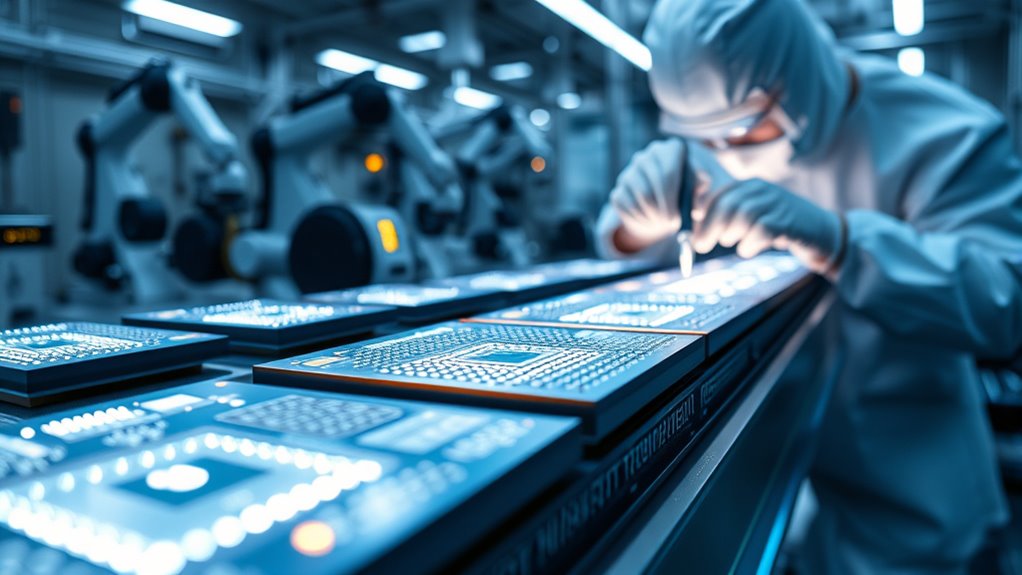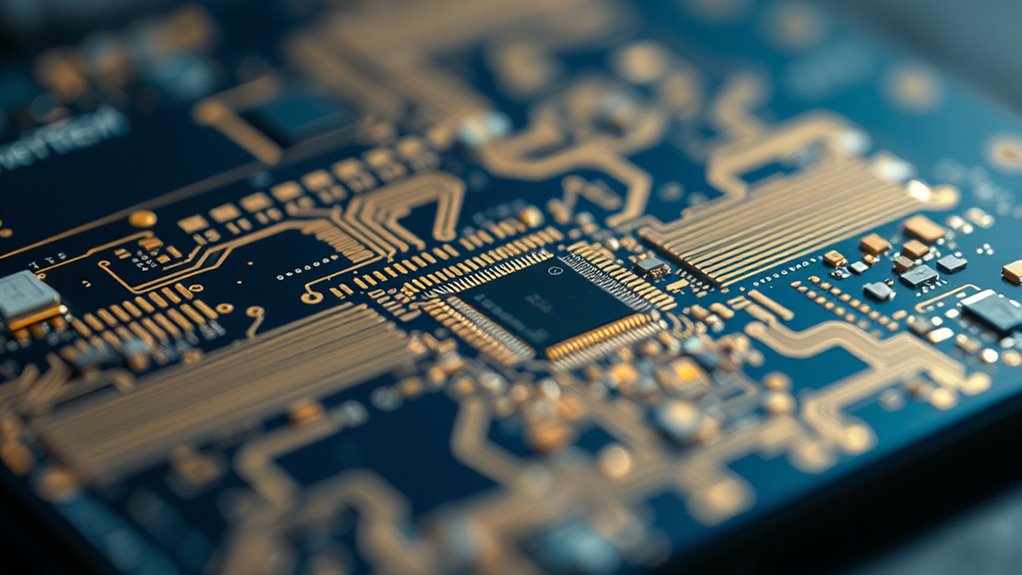Broadcom has developed OpenAI’s first custom AI chips, marking a notable milestone in specialized AI hardware. These chips are designed to boost performance, efficiency, and scalability for complex AI models, supporting data centers and edge devices. This move highlights the shift toward tailored hardware solutions that meet the increasing demands of AI workloads. To discover how this breakthrough could impact AI development and future innovations, keep exploring the details behind this exciting advancement.
Key Takeaways
- Broadcom has developed the first custom AI chips for OpenAI, marking a major milestone in specialized AI hardware.
- These chips are designed specifically for AI workloads, improving performance, efficiency, and scalability.
- The development signifies a shift toward tailored hardware solutions for advanced neural networks and large language models.
- Custom AI chips enhance AI training and inference capabilities, supporting larger and more complex models.
- This breakthrough reflects ongoing trends in AI hardware innovation, emphasizing customized solutions for diverse applications.

Broadcom has announced that it has produced OpenAI’s first custom AI chips, marking a significant milestone in the development of specialized hardware for artificial intelligence. This breakthrough highlights the evolving landscape of chip manufacturing, where companies are increasingly focusing on designing chips tailored specifically for AI workloads. As you follow AI hardware trends, it’s clear that general-purpose processors no longer suffice for the demanding tasks driven by large language models and complex neural networks. Instead, custom chips optimized for AI tasks deliver better performance, energy efficiency, and scalability. Broadcom’s involvement signals a shift towards more diverse and sophisticated hardware options, fueling innovation in the AI ecosystem.
In the domain of chip manufacturing, creating these custom AI chips involves meticulous design and engineering processes. Unlike traditional chips, which aim for broad compatibility, these AI-specific chips are built from the ground up to accelerate machine learning operations. They incorporate specialized cores and architectures that can handle massive parallel processing, reducing latency and power consumption. This focus on AI hardware trends reveals a move away from one-size-fits-all solutions towards highly customized hardware tailored for particular AI applications. You’ll notice that these chips are not just faster but are also optimized for deep learning frameworks, enabling AI models to run more efficiently and at scale.
The development of these chips is driven by the need for increased performance in data centers, research labs, and edge devices. As AI models grow larger and more complex, the demand for hardware that can keep pace intensifies. OpenAI’s custom chips, manufactured by Broadcom, exemplify this trend by providing a specialized platform that enhances AI training and inference. This move also underscores the importance of innovation in chip manufacturing to support the increasing computational demands. You’ll find that as companies adopt these new AI hardware solutions, they can push the boundaries of what’s possible with artificial intelligence, from real-time language translation to autonomous systems. Additionally, the rise of custom AI chips underscores the importance of specialized hardware in advancing AI capabilities across various sectors.
Frequently Asked Questions
How Will These Chips Impact AI Research and Development?
These chips will significantly boost AI research and development by accelerating AI training and enabling more complex models. You’ll benefit from hardware innovation that improves efficiency, reduces costs, and shortens development cycles. With these custom chips, you can push the boundaries of AI capabilities faster, opening new applications and insights. Ultimately, they make it easier for you to experiment, iterate, and innovate in the rapidly evolving AI landscape.
Are These Chips Available for Commercial Purchase Now?
You might wonder if these chips are available for commercial purchase now. While they’re a significant breakthrough, their market availability is limited because of specialized chip manufacturing processes. Broadcom is currently focusing on production for OpenAI’s specific needs, so general market access isn’t open yet. Keep an eye on announcements, as these advanced chips could become available in the future, transforming AI development and commercial applications.
What Distinguishes These Chips From Previous AI Hardware?
These chips stand out because of their advanced chip architecture, optimized specifically for AI workloads, which makes them more efficient than previous hardware. You’ll notice improved power efficiency, meaning they deliver high performance without consuming excess energy. This combination allows you to run complex AI models faster and more sustainably, giving you a significant edge in AI processing tasks. You’ll likely see better scalability and lower operational costs with these innovative chips.
How Does Broadcom Collaborate With Openai on Chip Design?
Like they say, many hands make light work. You see, Broadcom collaborates closely with OpenAI through design collaboration, sharing expertise to develop these custom AI chips. They work together on chip integration, ensuring the hardware meets OpenAI’s specific performance needs. This partnership allows for seamless communication between teams, accelerating innovation and creating chips tailored precisely for OpenAI’s AI models, ultimately pushing the boundaries of AI hardware.
Will These Chips Influence Future AI Hardware Standards?
Yes, these chips will influence future AI hardware standards. They push chip manufacturing boundaries, encouraging other companies to innovate and improve scalability. As you follow the industry, you’ll notice how these advancements set new benchmarks, inspiring broader adoption of custom AI solutions. This progress fosters a competitive environment that accelerates innovation, ultimately shaping the future of AI hardware by emphasizing performance, efficiency, and adaptability in chip design.
Conclusion
You might find it fascinating that Broadcom’s custom AI chips are expected to boost OpenAI’s processing efficiency by over 30%. This milestone highlights how collaborations like this are pushing AI capabilities forward. As you follow these developments, keep in mind that such innovations are not just technological feats—they’re shaping the future of AI-powered applications across industries. With breakthroughs like these, the next chapter in AI evolution looks more promising than ever.









